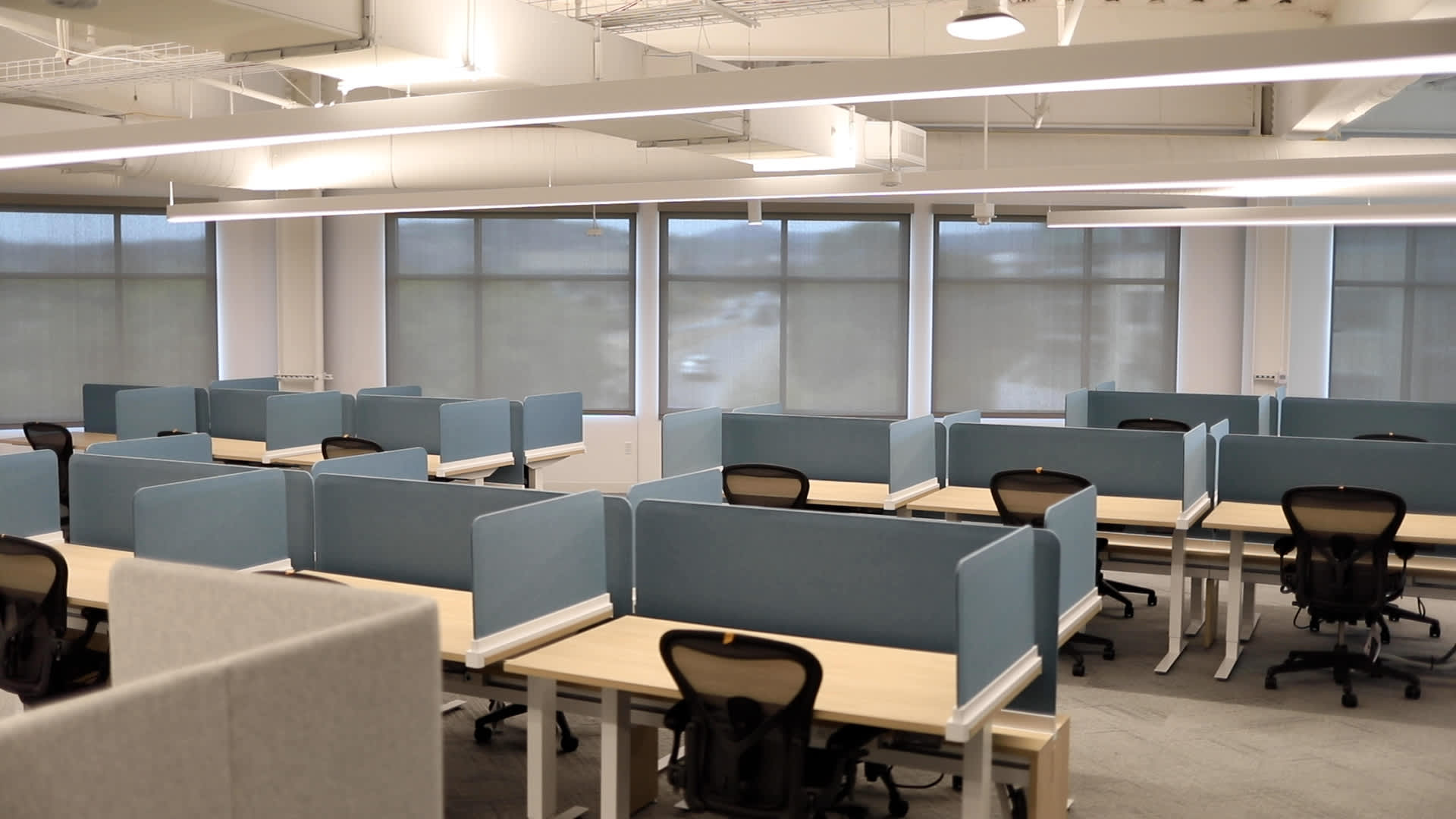How Snowflake is preparing its headquarters for employees to come back

Snowflake has spaced out desks for its workers and installed dividers for privacy and safety.
Katie Schoolov | CNBC
There’s a sense of impermanence at the headquarters of data-analytics software company Snowflake in San Mateo, California.
The cafeteria is closed while the company figures out how to space out tables and chairs. Drawers for employees’ desks are piled up and waiting to be hauled off. Planters have yet to be filled with plants.
After leasing space from Medallia in 2019, Snowflake came up with a plan that could accommodate its fast-growing team, with help from M Moser Associates, which has also advised cloud companies DocuSign and Okta on workplace design. Then coronavirus cases popped up across the U.S. in March 2020, and Snowflake revised the plan so that employees could feel safe and productive in the office once it’s safe to return, said Warrick Taylor, Snowflake’s vice president of global workplace and real estate.
Rather than attempting to offload office space onto an already overwhelmed subleasing market, Snowflake is holding onto all of its property.
The company is in no rush to usher employees back to the office, finance chief Mike Scarpelli told analysts on a conference call in December. But whenever the date arrives, Taylor’s team of operations, infrastructure design and construction project management people have figured out how to update the office so employees can spend most of their time working with other people instead of toiling away alone. At the same time, the company made changes to help people feel safe while on site.
Bathroom doors feature thin strips of metal a few inches from the ground that people can use to swing doors open without touching them. Inside the bathrooms, people can wash their hands without putting their fingers on faucet handles.
Metal wedges near the bottom of bathroom doors at Snowflake headquarters allow people to open the doors without using their hands.
Katie Schoolov | CNBC
In the cafeteria, people won’t be using tongs to grab salad from the salad bar. Employees will instead use an app to order meals and then pick it up at a specified station at a specified time. As a result, fewer people will be descending on the cafeteria at once.
That same app will eventually allow employees to reserve desks for the day as well.
Other desks will be assigned to individual staffers. Each desk is surrounded on three sides by a fabric-covered divider, which turns an open-office area into a cluster of almost-cubicles. These areas have far fewer desks than they would have if Snowflake had stuck to its pre-pandemic plan, Taylor said.
At the end of each day, employees will be required to remove their belongings from the surface of their desks and take them home or place them in dedicated lockers nearby. That way, cleaning crews can come by in the evening and sanitize desk surfaces. The plan was to place a chest of drawers below every desk, but after the pandemic, the company switched to giving employees lockers instead in hopes of reducing clutter.
The office lobby has fewer seats than in the original plan, and it’s designed to look more like a living room to make people feel more comfortable after the year of working from home. Snowflake also revamped the layout of the customer experience center where it will meet with clients. Conference rooms grew larger and seats around conference tables are now more spaced out.
A conference table at Snowflake headquarters is surrounded by movable translucent dividers that reduce noise.
Katie Schoolov | CNBC
Each employee going back to a Snowflake office will receive a personal marker and wipe for use with whiteboards, eliminating the need for sharing. They are among the giveaways included in a goodie bag emblazoned with a mask-clad polar bear.
There was one enhancement of the office that Warrick did not highlight during the tour. Snowflake installed sensors that will gather information on how people use desks and common areas, and the resulting data will help executives make decisions about how best to use its space in the future, a spokesperson told CNBC in an email.